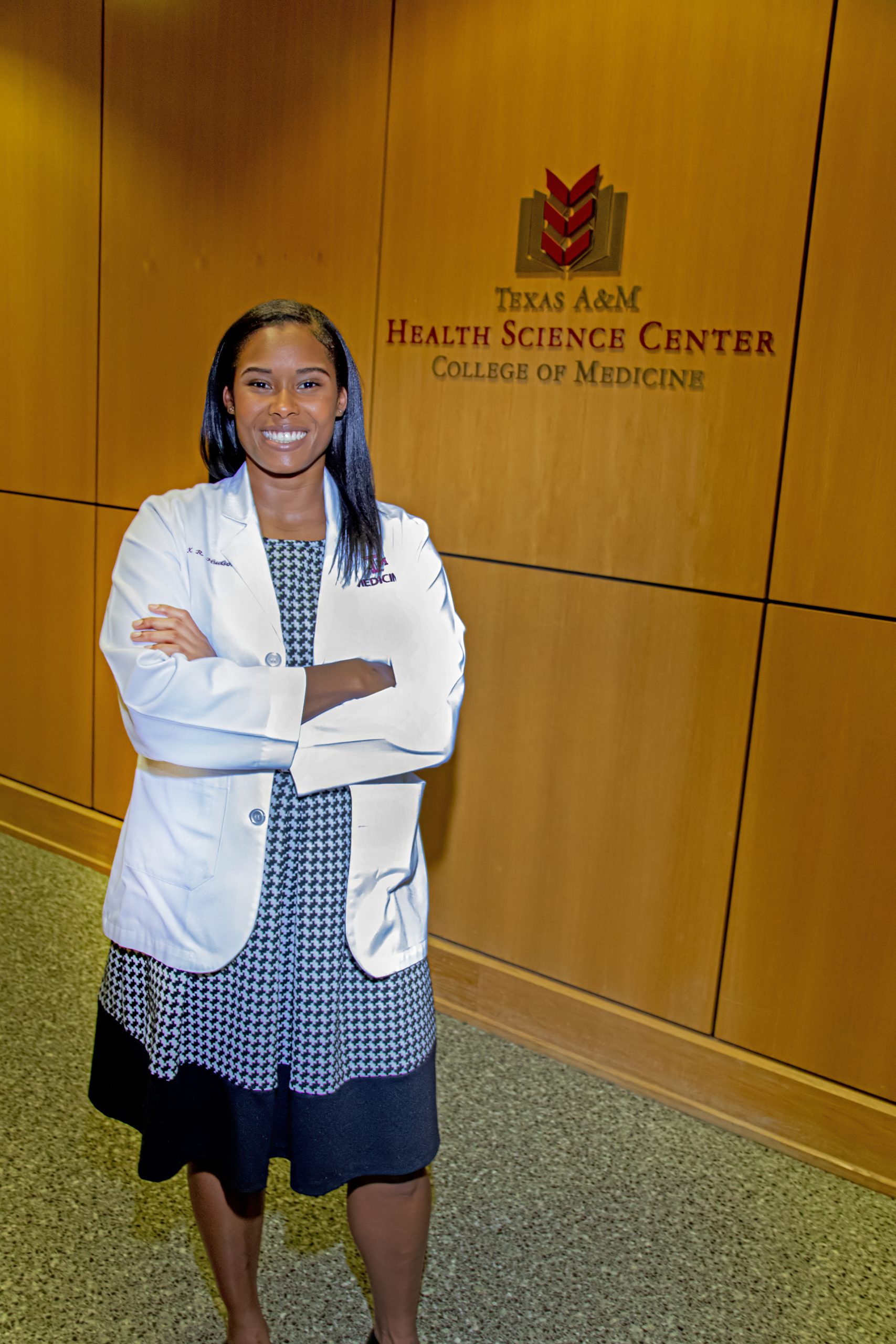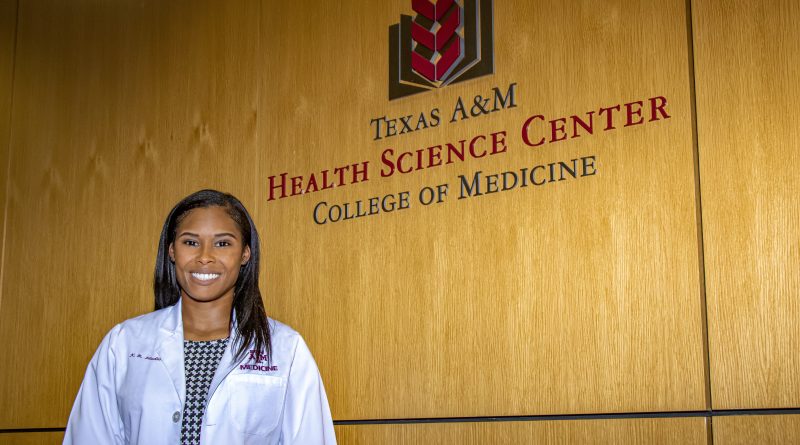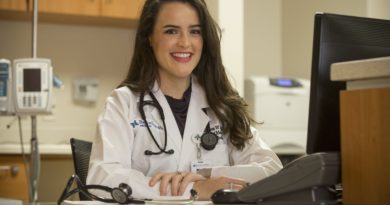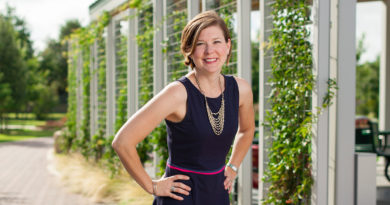Out of disaster, Kayla Hudson finds purpose
By Janna Zepp | Photos by Skeebo
Kayla Hudson’s medical and military career in Texas began in a hurricane.
 Hudson is a third-year medical student at Texas A&M University Health Science Center College of Medicine in Temple. As a teen, Hudson and her family evacuated to Texas from their home in New Orleans in 2005 during Hurricane Katrina. With nothing more than a duffle bag shared with her sister, Kayla and her family got in their car and traveled to Texas. Many in her extended family died in the storm.
Hudson is a third-year medical student at Texas A&M University Health Science Center College of Medicine in Temple. As a teen, Hudson and her family evacuated to Texas from their home in New Orleans in 2005 during Hurricane Katrina. With nothing more than a duffle bag shared with her sister, Kayla and her family got in their car and traveled to Texas. Many in her extended family died in the storm.
“That was a life-altering event. I come from a large, close-knit family including our extended relatives, and suddenly, we all were in the same devastating situation, unable to go to each other for shelter. We were suddenly homeless,” Hudson says. “Thankfully, a family friend reached out to help my family with open arms.”
Eventually, the family settled in Houston.
“Remaining in Texas was the best decision for the future since it did not seem like New Orleans would recover quickly. It was hard to wrap my head around leaving the only home I’d ever known and being so scattered from my family,” she says.
Hudson’s desire to become a physician began during childhood. Her mother was a registered nurse, so a career in the medical field was fascinating to her. She grew up watching her mother’s passion for her own career and Hudson wanted that for herself. “I was fascinated by her stories in the operating room, which made me want to be a surgeon as a 12-year-old,” she says.
In high school, Hudson joined pre-health societies to learn more about career options; medicine always felt like a calling. Eventually, she attended Texas A&M University and earned a Bachelor of Science in biology with a minor in French. Shadowing medical professionals throughout college and volunteering at free health clinics helped strengthen her desire to treat underserved populations.
“Choosing to become a doctor means to become a servant to society. This profession awards you with a level of trust with the lives of strangers and the expectation to improve the lives of others. Patients are more than individuals. They represent their families. As a physician, aiding one person leads to a domino effect for the lives to which they are connected,” she says. “It is an honor to be trusted to help so many during their most vulnerable moments when it comes to their health.”
Medicine is not Hudson’s only calling. She was also drawn to a career in the military. A military recruiter spoke with her about the benefits of serving in the military following medical school. She was immediately interested since she felt she could gain unique skill sets as an Army physician and it would help pay for medical school. She researched more about residency options and chose the Army as her branch of choice. Hudson is a second lieutenant and student in the Army Health Professions Scholarship Program.
“My father was an Army Ranger in the 3rd Ranger Battalion, 75th Ranger Regiment, so service in the military was familiar to me,” she says.
This year presented extra challenges for Hudson and her family. They battled COVID-19 together. Hudson had been studying for about 15 hours a day for 10 weeks to prepare for her medical school board exams. Going home to Houston and relaxing with her family was the only thing she wanted to do after completing her exam, and current events such as the pandemic and recent social unrest had added to her stress.
Shortly after coming home, her father began to develop flu-like symptoms. He complained of body aches, fever, and developed a painful cough that seemed to come from nowhere. They immediately isolated him to his bedroom, but that one day of hanging out together was enough to expose the entire family.
Family members began to develop symptoms over the following week, but by far, Hudson’s father had the worst symptoms. About 14 days after he tested positive for COVID-19, he had an episode of chest pain, fever, sweating, and shortness of breath that required medical attention at the hospital. Having had personal deaths of family friends due to complications, they prayed he would not have to remain hospitalized.
“Thankfully, my dad was swiftly treated and able to return home after a couple of hours at the hospital. A week following that scary incident we all were able to recover without any further complications,” Hudson says.
Hudson says her biggest challenge in medical school has been figuring out a balance between her studies and her health. She says that with each new body system or medical specialty, there is an adjustment period required to calibrate amount of time needed to study effectively.
“I am a big planner, so when I get in a groove and figure out what is feasible, I can carve out time to dedicate to my loved ones and exercise. It isn’t always easy to find a balance, but I make sacrifices to maintain the most important relationships in my life as well as remaining successful academically,” she says. “One of my favorite things about medical school has been the friendships and support I’ve gained from my classmates as we all pursue medicine together. We jokingly call it ‘shared suffering.’”
Hudson admits that there is a stereotype of medical school being cut-throat or having a maliciously competitive environment, but her experience at Texas A&M has completely contradicted that image.
“My class is full of intelligent and driven individuals yet there is a culture of camaraderie, built through our Aggie Core Values, to help each other succeed. From the beginning, there has been student-led tutoring sessions and notes passed within our class and from classes above us.
“This mentality at Texas A&M fosters the idea of teamwork, which is imperative for success in the medical field,” Hudson says. “If I weren’t a doctor, I would definitely choose another profession in the medical field. I love the operating room, so maybe I would have become a surgical physician’s assistant to have an active hand in surgical procedures. However, a fantasy occupation of mine is teaching English in a French speaking country. I earned a minor in French in undergrad, so I think it would be cool to spend some time abroad and perfect my understanding of the French language.”
Hudson feels the medical school is a great fit for her because TAMU Health Science Center College of Medicine has three areas of excellence: military medicine, innovation through engineering to medicine, and rural health. As a student committed to working in military medicine, she appreciates the medical school’s support of their military students.
“I recently returned from a four-week training course required for my military commitment, and I did not realize how difficult it could be to schedule trainings at other medical schools. We have training obligations to fulfill through the military, and even though medical school comes first, if requirements aren’t completed, it leaves the student at a disadvantage in the long run,” she says.
“I didn’t realize how lucky I was to attend a school that places such emphasis on military medicine, and Texas A&M College of Medicine has been flexible with our schedule to ensure we graduate with our military and academic requirements fulfilled.”
For Hudson, medicine’s calling is not just about serving an underserved community, but about representation.
“Being a Black physician comes with an added personal sense of representation. I want to care for my patients and be a step in the direction of diversifying medicine. African American and Latinx demographics are significantly lacking in the medical field as physicians and nurses, and with each one, we are one step closer to making some dreams and aspirations come true,” Hudson says.
“As a Black physician, I take responsibility in being a part of that change and convincing my counterparts to join me in my efforts to make this world a better place for us all.”




